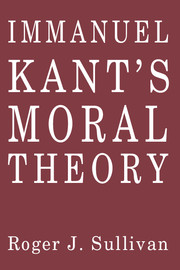Book contents
- Frontmatter
- Contents
- Preface
- Key to abbreviations and translators
- 1 Introduction
- 2 The context for Kant's moral philosophy
- Part I The nature of morality
- Part II The moral norm for persons
- Part III The norm for moral judgment
- Part IV Kant on history, politics, and religion
- 16 Autonomy and the state
- 17 Civil justice and republicanism
- 18 Kant's philosophy of religion
- Appendixes
- Notes
- Bibliography
- Index of names
- Index of subjects
16 - Autonomy and the state
Published online by Cambridge University Press: 05 June 2012
- Frontmatter
- Contents
- Preface
- Key to abbreviations and translators
- 1 Introduction
- 2 The context for Kant's moral philosophy
- Part I The nature of morality
- Part II The moral norm for persons
- Part III The norm for moral judgment
- Part IV Kant on history, politics, and religion
- 16 Autonomy and the state
- 17 Civil justice and republicanism
- 18 Kant's philosophy of religion
- Appendixes
- Notes
- Bibliography
- Index of names
- Index of subjects
Summary
Immanuel Kant's entire life was spent under absolute hereditary monarchs who retained their thrones by means of conscripted armies as well as the mutually advantageous support of a hereditary nobility with power, wealth, and privileges never shared by the peasants. (See, e.g., Conflict 89/161; Ed. 448/15.) Frederick II (Frederick the Great) ruled Prussia during most of Kant's adult life, from 1740 to 1786. Although Frederick in fact enjoyed despotic power, his official view of himself was as the “first servant of his people.” Most of his subjects would probably have been surprised to learn that they lived in an enlightened age, but Frederick prided himself on his commitment to the Enlightenment. Even today he is usually described as a benevolent and enlightened monarch who compares favorably with all the Prussian kings before him and most after him.
While still the crown prince, Frederick had been encouraged by Voltaire to pen a “refutation” of Machiavelli's Prince, which Voltaire then edited and had published in The Hague. Later, in his Memoirs, Voltaire wrote: “If Machiavelli had had a prince for disciple, the first thing he would have recommended him to do would have been to write a book against Machiavellism!” Voltaire's rationale was simple: Since Machiavelli had advised a prince to use his power, whenever possible, under the mantle of virtue, a wise student of Machiavelli should publicly attack his tutor's infamous amoralism.
- Type
- Chapter
- Information
- Immanuel Kant's Moral Theory , pp. 233 - 245Publisher: Cambridge University PressPrint publication year: 1989



